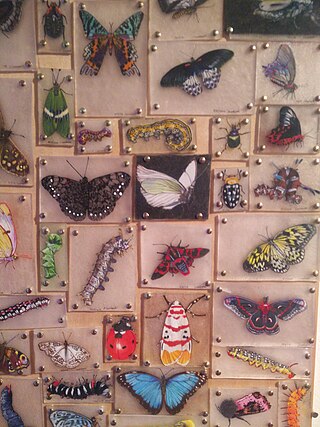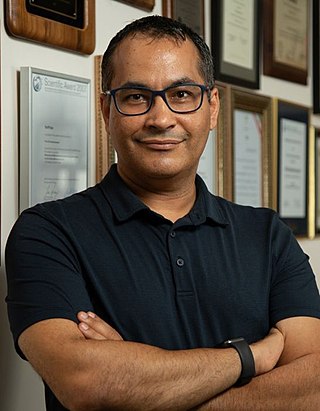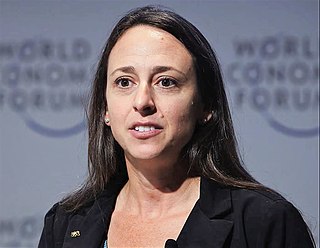
Shrink art, Shrinky Dinks, or Shrinkles is a toy and activity kit consisting of sheets of polystyrene which can be cut with standard household scissors. When heated, the cut shapes become about nine times thicker while their horizontal and vertical dimensions reduce to about one-third the original size, resulting in hard, flat forms which retain their initial color and shape. They reached the height of their popularity in the 1980s and are still available from retailers. They can be used for a variety of things like charms and pins. Most sets are pre-printed with outline images of popular children's characters or other subjects, which are then colored in before baking.
Robert Drost is an American computer scientist. He was born in 1970 in New York City.
The Innovators Under 35 is a peer-reviewed annual award and listicle published by MIT Technology Review magazine, naming the world's top 35 innovators under the age of 35.

Carolyn Ruth Bertozzi is an American chemist and Nobel laureate, known for her wide-ranging work spanning both chemistry and biology. She coined the term "bioorthogonal chemistry" for chemical reactions compatible with living systems. Her recent efforts include synthesis of chemical tools to study cell surface sugars called glycans and how they affect diseases such as cancer, inflammation, and viral infections like COVID-19. At Stanford University, she holds the Anne T. and Robert M. Bass Professorship in the School of Humanities and Sciences. Bertozzi is also an Investigator at the Howard Hughes Medical Institute (HHMI) and is the former director of the Molecular Foundry, a nanoscience research center at Lawrence Berkeley National Laboratory.
The Energy Biosciences Institute (EBI) is an organization dedicated to developing new sources of energy and reducing the impact of energy consumption. It was created in 2007 to apply advanced knowledge of biology to the challenges of responsible, sustainable energy production and use. Its main goal is to develop next-generation biofuels—that is, biofuels that are made from the non-edible parts of plants and reduce greenhouse gas emissions.

Ali Khademhosseini is an Iranian-born Canadian-American engineer. He is the CEO of the Terasaki Institute, non-profit research organization in Los Angeles, and Omeat Inc., a cultivated-meat startup. Before taking his current CEO roles, he spent one year at Amazon Inc. Prior to that he was the Levi Knight chair and professor at the University of California-Los Angeles where he held a multi-departmental professorship in Bioengineering, Radiology, Chemical, and Biomolecular Engineering as well as the Director of Center for Minimally Invasive Therapeutics (C-MIT). From 2005 to 2017, he was a professor at Harvard Medical School, and the Wyss Institute for Biologically Inspired Engineering.
Hang Lu is the "Love Family" Professor of Chemical and Biomolecular Engineering at the Georgia Institute of Technology. She directs a research group on the use of microfluidics devices engineered to aid in the study of questions in the biological sciences.
Utkan Demirci is a tenured professor and a successful serial academic entrepreneur at Stanford University at the departments of Radiology and Electrical Engineering. He served as the Interim Division Chief and Director of the Canary Center at Stanford for Cancer Early Detection in the Department of Radiology.

The California Institute for Quantitative Biosciences (QB3) is a nonprofit research and technology commercialization institute affiliated with three University of California campuses in the San Francisco Bay Area: Berkeley, San Francisco, and Santa Cruz. QB3's domain is the quantitative biosciences: areas of biology in which advances are chiefly made by scientists applying techniques from physics, chemistry, engineering, and computer science.
The Center for Information Technology Research in the Interest of Society and the Banatao Institute (CITRIS) is a research institute operated by the University of California to facilitate the real-world applications of technological research. Approved in 2000, it is part of the Governor Gray Davis Institutes for Science and Innovation, along with the California Institute for Quantitative Biosciences, California Institute for Telecommunications and Information Technology, and the California Nanosystems Institute. Headquartered at UC Berkeley, CITRIS was founded in 2001 from a desire to see innovative technologies put to practical use in improving the quality of life for people. CITRIS's partner campuses include UC Davis, UC Merced and UC Santa Cruz.
Michelle C. Y. Chang is a Professor of Chemistry and Chemical and Biomolecular Engineering at the University of California, Berkeley, and is a recipient of several young scientist awards for her research in biosynthesis of biofuels and pharmaceuticals.
Christopher J. Chang is a professor of chemistry and of molecular and cell biology at the University of California, Berkeley, where he holds the Class of 1942 Chair. Chang is also a member of the Helen Wills Neuroscience Institute, a Howard Hughes Medical Institute investigator, adjunct professor of pharmaceutical chemistry at the University of California, San Francisco, and faculty scientist at the chemical sciences division of Lawrence Berkeley Lab. He is the recipient of several awards for his research in bioinorganic chemistry, molecular and chemical biology.
Trey Ideker is a professor of medicine and bioengineering at UC San Diego. He is the Director of the National Resource for Network Biology, the San Diego Center for Systems Biology, and the Cancer Cell Map Initiative. He uses genome-scale measurements to construct network models of cellular processes and disease.
Dawn Song is a Chinese American academic and is a professor at the University of California, Berkeley, in the Electrical Engineering and Computer Science Department.

Jennifer Anne Doudna is an American biochemist who has pioneered work in CRISPR gene editing, and made other fundamental contributions in biochemistry and genetics. Doudna was one of the first women to share a Nobel in the sciences. She received the 2020 Nobel Prize in Chemistry, with Emmanuelle Charpentier, "for the development of a method for genome editing." She is the Li Ka Shing Chancellor's Chair Professor in the department of chemistry and the department of molecular and cell biology at the University of California, Berkeley. She has been an investigator with the Howard Hughes Medical Institute since 1997.

Jeffrey Michael Heer is an American computer scientist best known for his work on information visualization and interactive data analysis. He is a professor of computer science & engineering at the University of Washington, where he directs the UW Interactive Data Lab. He co-founded Trifacta with Joe Hellerstein and Sean Kandel in 2012.

Andrew James deMello is a British chemist and Professor of Biochemical Engineering at ETH Zürich.

Amy Elizabeth Herr is an American professor. She is the John D. and Catherine T. MacArthur Professor at the University of California, Berkeley, where she is attached to the Department of Bioengineering. At Berkeley she was also the founding executive director of the Bakar Bioenginuity Hub. Herr is a Chan Zuckerberg BioHub Investigator and the Chief Technology Officer of the Chan Zuckerberg Biohub Network, a fellow of both the National Academy of Inventors and the American Institute of Medical and Biological Engineering, as well as a co-founder of Zephyrus Biosciences, a biotechnology company that was acquired by Bio-Techne.

Rachel A. Segalman is the Edward Noble Kramer Professor and Department Chair of Chemical Engineering at University of California, Santa Barbara (UCSB). Her laboratory works on semiconducting block polymers, polymeric ionic liquids, and hybrid thermoelectric materials. She is the associated director of the Center for Materials for Water Energy System, an associate editor of ACS Macro Letters, and co-editor of the Annual Review of Chemical and Biomolecular Engineering.
Aaron Michael Streets is an African American bioengineer and associate professor in the Department of Engineering at the University of California, Berkeley in Berkeley, California. He is the principal investigator at the Streets Lab, where he and his team use tools from mathematics, physics, and engineering to study biology. Streets is currently developing microfluidic technology for single-cell measurements due to its high-resolution imaging.








